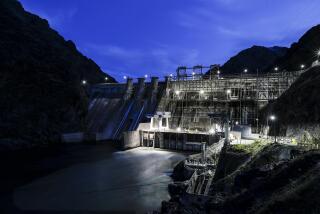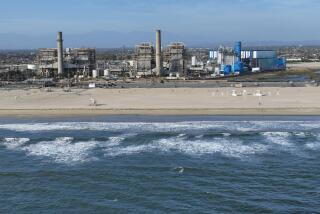COLUMN LEFT : Cuomo Scores One for the Cree Nation : By canceling an extravagant hydroelectric plan, he shocks Quebec, saves a natural bay.
- Share via
Grande Baleine, the Great Whale River, lies at the center of a pristine subarctic wilderness 650 miles north of Montreal. The Cree Indians, who have lived there for 6,000 years, call it “the Garden.” Until last month, they faced the prospect that their ancestral homeland would be submerged under the floodwaters of the vast hydroelectric project known as James Bay.
But New York Gov. Mario Cuomo now appears to have killed off one of the most extravagant follies ever contrived by homo technologicus. On March 27, he abruptly canceled a contract with the Hydro-Quebec utility, under which the New York Power Authority would have purchased $17 billion worth of electricity over 20 years, beginning in 1995.
The New York contract was the key to the lifelong separatist dream of Quebec Premier Robert Bourassa. In Bourassa’s imagination, the entire James Bay project--of which Great Whale was the latest phase--was the economic guarantee of Quebec’s ability to secede from Canada.
The James Bay project was not designed to meet Quebec’s own energy needs; its power output was strictly for export. When Bourassa returned to office in 1985, he promised U.S. businessmen that Great Whale alone would generate the annual equivalent of 212 million barrels of petroleum. Once the whole grand design was executed, Bourassa told them, James Bay would be the world’s largest hydroelectric project, with a generating capacity of 27,000 megawatts by 1998. But Cuomo’s decision will leave two-thirds of Bourassa’s dream unfulfilled.
Bourassa never made any secret of his contempt for the 10,000 Indians who stood in the way of his plan to convert water into dollars. “Bourassa’s dream has become our nightmare,” said Matthew Coon-Come, grand chief of the Crees. The enormous complex of dams and dikes would have affected an area the size of California. Yet Hydro-Quebec began work on the project in 1971 without any assessment of its environmental impact.
Together with Hudson Bay, which adjoins it to the north, James Bay acts as a kind of natural funnel for innumerable species of migratory birds as they make their way south to wintering grounds as remote as Tierra del Fuego. In the bay’s delicate tracery of salt-water marshes, ribbon bogs and taiga, and in its vast beds of eelgrass, the birds find feeding stations that are vital to their survival.
Birds have not been the only ones affected. The soils of “the Garden” are rich in inorganic mercury, and when the dams of James Bay inundated the land, the drowned trees rotted, releasing the metallic chemical into the food chain in the form of methyl mercury. This accumulated first in the lake trout, the Northern pike and the whitefish, and from there made its way into the bodies of the Cree.
In 1985, when tests were conducted on a sample group of 1,300 Indians, more than half of them were found to have mercury levels in excess of World Health Organization standards.
Cancellation of the New York contract has been the cornerstone of a long campaign by the Grand Council of the Crees. Under Cree pressure, the New York Power Authority insisted last August on a full environmental review before Hydro-Quebec could begin work on the access roads and airstrips for Great Whale. Now Cuomo has stunned Quebec by pulling out of the deal altogether. In Chisasibi and the other scattered Cree villages of James Bay, there is the unaccustomed sound of celebration.
Let’s not be sentimental, however. The governor’s office insists that its decision was based on bottom-line economics; it makes no mention of any emotional attachment to the ancient hunting grounds of the Cree or the migration paths of the marbled godwit. In the end, New York simply decided that energy conservation was a cheaper option than electricity from James Bay. But that in itself is an environmental victory of the highest order. Prodded by the Cree and their supporters, Mario Cuomo came to understand that energy efficiency makes sound economic sense.
Contrast Cuomo’s verdict on Great Whale with the conduct of the man who once pledged, in a long-forgotten election year, to be our “environmental President.” Citing the pressures of another campaign, George Bush now threatens to stay away from the Earth Summit in Rio de Janeiro in June--or, if he does attend, to withhold his signature from a treaty limiting emission of the gases that cause global warming. It may seem tactless to say so on the eve of the New York primary, but the whole affair makes Mario Cuomo look, well, downright presidential.
More to Read
Sign up for Essential California
The most important California stories and recommendations in your inbox every morning.
You may occasionally receive promotional content from the Los Angeles Times.











